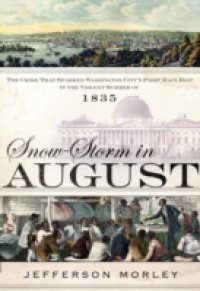A gripping narrative history of the explosive events that drew together Francis Scott Key, Andrew Jackson, and an 18-year-old slave on trial for attempted murder. In 1835, the city of Washington pulsed with change. As newly freed African Americans from the South poured in, free blacks outnumbered slaves for the first time. Radical notions of abolishing slavery circulated on the city's streets, and white residents were forced to confront new ideas of what the nation's future might look like.On the night of August 4th, Arthur Bowen, an eighteen-year-old slave, stumbled into the bedroom where his owner, Anna Thornton, slept. He had an ax in the crook of his arm. An alarm was raised, and he ran away. Word of the incident spread rapidly, and within days, Washington's first race riot exploded, as whites fearing a slave rebellion attacked the property of the free blacks. Residents dubbed the event the ';Snow-Storm," in reference to the central role of Beverly Snow, a flamboyant former slave turned successful restaurateur, who became the target of the mob's rage.In the wake of the riot came two sensational criminal trials that gripped the city. Prosecuting both cases was none other than Francis Scott Key, a politically ambitious attorney famous for writing the lyrics to ';The Star-Spangled Banner,' who few now remember served as the city's district attorney for eight years. Key defended slavery until the twilight's last gleaming, and pandered to racial fears by seeking capital punishment for Arthur Bowen. But in a surprise twist his prosecution was thwarted by Arthur's ostensible victim, Anna Thornton, a respected socialite who sought the help of President Andrew Jackson.Ranging beyond the familiar confines of the White House and the Capitol, Snow-Storm in Augustdelivers readers into an unknown chapter of American history with a textured and absorbing account of the racial secrets and contradictions that coursed beneath the freewheeling capital of a rising world power."Snow-Storm in August is the sort of book I most love to read: history so fresh it feels alive, yetintroducing me toatime and place that I hadlittle known or utterly misunderstood. After reading Jefferson Morley's vibrant account, one can never hear'The Star-Spangled Banner' the same way again."David Maraniss, author of Barack Obama: The StoryFrom the Hardcover edition.

